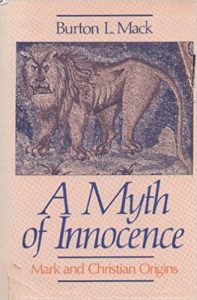 In A Myth of Innocence: Mark and Christian Origins Burton L. Mack crudely summarizes what he sees as the legacy Mark’s Gospel in the form of the Christian myth that has become the lens through which Western (particularly American) culture has viewed the world:
In A Myth of Innocence: Mark and Christian Origins Burton L. Mack crudely summarizes what he sees as the legacy Mark’s Gospel in the form of the Christian myth that has become the lens through which Western (particularly American) culture has viewed the world:
The Markan legacy is a myth of innocence that separates those who belong to the righteous kingdom within from those without. The boundaries, however, are not at all static. The borders shift as conflicts arise both within and without. Separation occurs when the mission to convert the other is thwarted. Judgments fall to support the righteous cause as justified and the recalcitrant other as wrong. A period of time is devoted to patient proclamation, but an either/or approach to issues excludes the middle range of compromise. Conversion means loyalty to the cause of the righteous; rejection means consignment to the forces of opposition. Ultimately, should the mission be threatened with failure, victims may be sacrificed. That is because the cause is righteous and must somehow prevail. The sign of failure, a crucifixion, also serves as the sign of victory. If all else fails, both martyrdom and the destruction of the wicked can be imagined as the means for vindicating the cause and trusting in the power of God to resurrect a new creation from the ashes. (p. 372)
I don’t know if this view is a pop rationalization or if it has roots in serious psycho-sociological research. (I suspect it too glibly side-steps politico-economic structures and universal geopolitical realities, as well as something distinctively Manichaean within America’s soul) But it sounds plausible and interesting. Broken down it looks like this:
- Jesus/Western power originates conscious of having lots to offer, being a great person/nation etc
- Jesus/Western power projects what it has to offer to others, with mixed results: some embrace, some reject, and some of the latter become hostile
- Jesus/Western power love those who demonstrate they are with them, and demonize those who are not; those who are hostile fail to understand the goodness/innocence of Jesus/the Western power.
- When Jesus/Western power suffer a major setback/defeat this is seen as a tragic martyrdom, suffering as a result of being good while misunderstood, of being so good others cannot comprehend the goodness, etc. The suffering is unjust; it is the suffering of the innocent one whose intentions are good but who is misunderstood and wrongfully hated.
- Out of the suffering comes the hope and expectation of a renewed life, a just vengeance wreaked against the enemies, and a final exaltation of the innocent and righteous one.
It’s not a healthy state of mind — religiously, personally or geo-politically.
If you enjoyed this post, please consider donating to Vridar. Thanks!

When I first read that, I thought Mack was a “useful idiot” for the Soviets. I’m no less convinced now. The Soviets were of course still around in 1988 when this book was published and he was by no means the only academic outside polisci or political phl moonlighting as an expert on American politics. Someone whose sole skill is studying verbal aspect in the gospels or the origins of Christianity is not qualified to speak about American “myth” like this.